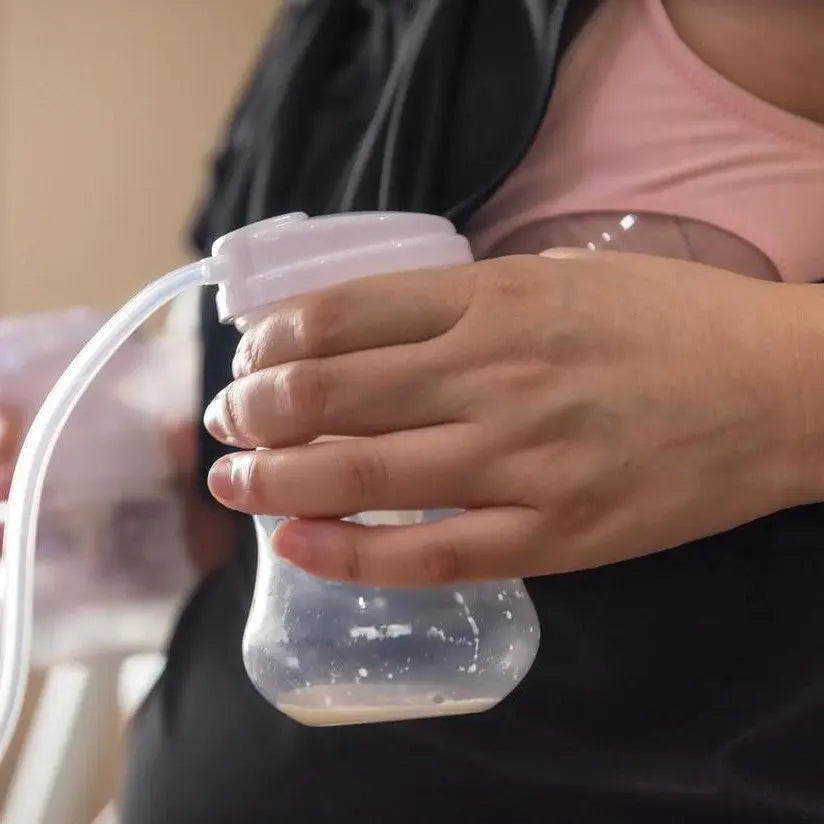
FAQ About Pumping
Pumping is mostly a go-to method for all breastfeeding moms.
However, you might have several questions regarding its schemes, routines and proper techniques.
Today I will clarify several ambiguous conceptions and answer your frequently asked questions about pumping
To watch my full video, click on this link.

1. Do I need a pump if I’m breastfeeding?
This question reminds me of when I used to breastfeed, and was not planning on going back to work. Accordingly, I assumed that I don’t need a pump. However, I was WRONG.
Despite not going back to work, you still need to have pumped milk in case you needed to go out or were busy.
Breastfeeding is a commitment, and could be done exclusively until the age of 2 years as recommended by WHO. It has endless benefits for the baby’s immunity, IQ, and safety against several diseases like heart problems, high blood pressure, diabetes and cancer.
Therefore, the best alternative to help you get back to your life while maintaining a healthy lifestyle for your baby is pumping!
2. Which pump should I get?
First of all, you have to know that pumps generally come in 2 types, manual and electric.
However, the manual one takes more time and effort to give you the needed results and quantities.
Therefore, I recommend the electric pump, which comes in 3 types:
- Single electrical: pumps from one side
- Double electrical: pumps from both breasts simultaneously
- Hospital grade: the strongest type, usually found in hospitals and could be costly, but hospitals generally lend it. It can help if you had a premature birth and need exclusive pumping
However, to avoid extra spending and get the optimal solution, I recommend double electrical especially if you’re a working mom.
Tip: A pump extracts more effectively when plugged into the electricity socket rather than batteries.
3. Does the flange size matter?
Yes, it’s essential to have a proper sized flange, so that the nipple is not touching the corners, and pumping is performed without any pain. If your nipple is not contracting well, try a bigger sized flange.
4. Can I add pumped milk from 2 sessions together?
You can add pumped milk from 2 sessions together, but make sure the temperature of both of them is similar. Therefore, put the newly pumped milk in the fridge until its temperature is close to that of the old one, and mix them together afterward.
After mixing, you can add the milk into freezing bags. However, make sure the milk is in 100-120ml batches, since your baby might not need more than this amount, and you’ll have to throw away the left-over defrosted milk.
Tip: Never re-freeze defrosted milk. Also, never defrost at room temperature for more than 2 hours, since it may lead to increased bacteria in the milk and may cause poisoning.
5. Is it normal for a breast to make more milk than the other?
Most moms face this and it’s totally normal! Therefore, let your baby breastfeed from the breast with less milk to induce milk formation, then move to the breast with more milk.
Tip: Moms have the highest amount of milk in the morning (5-6 am), and fewer milk amounts after 5 pm.
6. Can a woman exclusively pump from one side?
Of course! You can breastfeed from one side. Moms’ bodies are made to feed on one breast, and even feed 2-3 babies.
Tip: When you pump, always label your milk with the date and use the old ones first.
However, if you’re planning on pumping alone, pump 6-8 times per day and your milk formation will increase over the weeks. Give your body the needed time, and it will all be okay.
Eventually, never underestimate the importance of pumping in increasing your milk formation, and aiding you in busy times.
Want more tips for breastfeeding and pumping?
You can get access to my breastfeeding course on the following link.

I hope this was helpful!
Mirna Sabbagh, an adult and child dietitian, nutritionist, and lactation consultant. She also has several digital courses: Pregnancy Nutrition Course, breastfeeding course, starting solids 6-12 months course, and also child nutrition for all children including picky eaters, that you can sign up for from the comfort of your home.
The courses are pre-recorded. As soon as you make the course purchase, you will receive a link to watch the course from your phone or laptop.
You can also e-mail Mirna for questions on info@mirnaelsabbagh.com
Mirna is no longer doing consultations. Her online courses and webinars cover 95% of parents common concerns.
